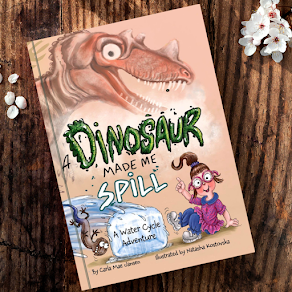Developing early reading skills begins long before actually learning to read. This week and next week, I will be sharing a mini-series about developing these early reading skills in preschoolers!
I recently took a professional development class about early reading skills, and as I sat through the lessons I became more and more convinced that you can teach these early reading skills through simple, playful interactions with your young children.
If you haven't already read my post about how preschoolers' brains develop, I strongly suggest you read that first. Everybody wants their young children to read as early as possible, but pushing them when they're not ready is actually damaging. On the other hand, these "pre-reading" skills can be "taught" while you simply read to your children!
During this mini-series, I will address four early reading skills, what they are, why they are important, how you can "teach" them to young children, and (for those of you teaching preschool groups) how you can teach them to a group of kiddos. We will end with a wrap-up post next week! As I post, I will link the posts to each of these labels:
1- Print Awareness
2- Phonological Awareness (this post!)
3- Phonics
4- Strategies
5- Wrap Up!
So, let's get started!!
An awareness of sounds and how they work.
This includes sentences, words, and phonemes (sounds inside words).
Phonological awareness is primarily auditory!! It does not involve print, but it can use visual and kinesthetic activities.
When your children begin to read, they will be translating written print into sounds, words, and sentences they have heard before. The more familiar they are with a variety of sounds and how they interact, the more success they will have reading.
If you haven't already read my post about how preschoolers' brains develop, I strongly suggest you read that first. Everybody wants their young children to read as early as possible, but pushing them when they're not ready is actually damaging. On the other hand, these "pre-reading" skills can be "taught" while you simply read to your children!
During this mini-series, I will address four early reading skills, what they are, why they are important, how you can "teach" them to young children, and (for those of you teaching preschool groups) how you can teach them to a group of kiddos. We will end with a wrap-up post next week! As I post, I will link the posts to each of these labels:
1- Print Awareness
2- Phonological Awareness (this post!)
3- Phonics
4- Strategies
5- Wrap Up!
So, let's get started!!
Phonological Awareness
1. What is Phonological Awareness:
An awareness of sounds and how they work.
This includes sentences, words, and phonemes (sounds inside words).
Phonological awareness is primarily auditory!! It does not involve print, but it can use visual and kinesthetic activities.
2. Why is Phonological Awareness important:
When your children begin to read, they will be translating written print into sounds, words, and sentences they have heard before. The more familiar they are with a variety of sounds and how they interact, the more success they will have reading.
3. How to "teach" Phonological Awareness to your own child:
** Talk to your child! And encourage them to talk back to you!
** Play rhyming games like these or this while you fix dinner or drive places.
** Drag out a random sound in a word as you talk to your children. For example, instead of saying "lunch," say "luuuuuuuuuuuuuunch." As your kiddos get used to the game, you can drag out more than one sound like "llllllllllllluuuuuuuuuuuunnnnnnnnnnnnnnch."
** Play rhyming games like these or this while you fix dinner or drive places.
** Drag out a random sound in a word as you talk to your children. For example, instead of saying "lunch," say "luuuuuuuuuuuuuunch." As your kiddos get used to the game, you can drag out more than one sound like "llllllllllllluuuuuuuuuuuunnnnnnnnnnnnnnch."
4. How to teach Phonological Awareness to a group of preschoolers:
** Clap or snap occasionally as you say a word--one clap or snap for each sound, so "mat" would have three claps: one for the "m," one for the "a," and one for the "t" sounds.
** March to the beat of syllables in a chant as you walk.
** Emphasize the first sound in words and string other words together that start the same way. For example, as everyone gathers for a book say, "B- b- b- b- book starts with b, just like berry, bin, and bike!" Encourage your kiddos to think of other words that start the same.
** Play rhyming games like these or this while you wait in line or transition.
5. Goals
During the kindergarten year in Texas, children are expected to identify syllables in spoken words, identify a sentence made up of a group of words, and orally generate rhymes when asked "What rhymes with ___?" You can help children work towards these goals by exposing them to syllables and letting them think about sounds while they are in preschool. If your preschoolers are not ready to rhyme yet, do not stress about it! Just keep exposing them to the sounds and rhymes...when they are ready, it will be easy for them!
** March to the beat of syllables in a chant as you walk.
** Emphasize the first sound in words and string other words together that start the same way. For example, as everyone gathers for a book say, "B- b- b- b- book starts with b, just like berry, bin, and bike!" Encourage your kiddos to think of other words that start the same.
** Play rhyming games like these or this while you wait in line or transition.
5. Goals
During the kindergarten year in Texas, children are expected to identify syllables in spoken words, identify a sentence made up of a group of words, and orally generate rhymes when asked "What rhymes with ___?" You can help children work towards these goals by exposing them to syllables and letting them think about sounds while they are in preschool. If your preschoolers are not ready to rhyme yet, do not stress about it! Just keep exposing them to the sounds and rhymes...when they are ready, it will be easy for them!
I hope you find this series about developing early reading skills in preschoolers encouraging and exciting, and that you join us for the rest of the posts! Feel free to email or leave comments with feedback, your own experiences, or your own tips!!
I may share at any of these parties!
 Never miss another post again! Sign up for our weekly updates newsletter and get links to all our posts once a week in your inbox! Sign up here!!
Never miss another post again! Sign up for our weekly updates newsletter and get links to all our posts once a week in your inbox! Sign up here!!

















2 comments:
Thanks for these tips! My toddler is entering this stage right now, and already has awareness of sounds of letters.
You're welcome!! It's amazing how early some kiddos start to pick up on sounds!
Post a Comment